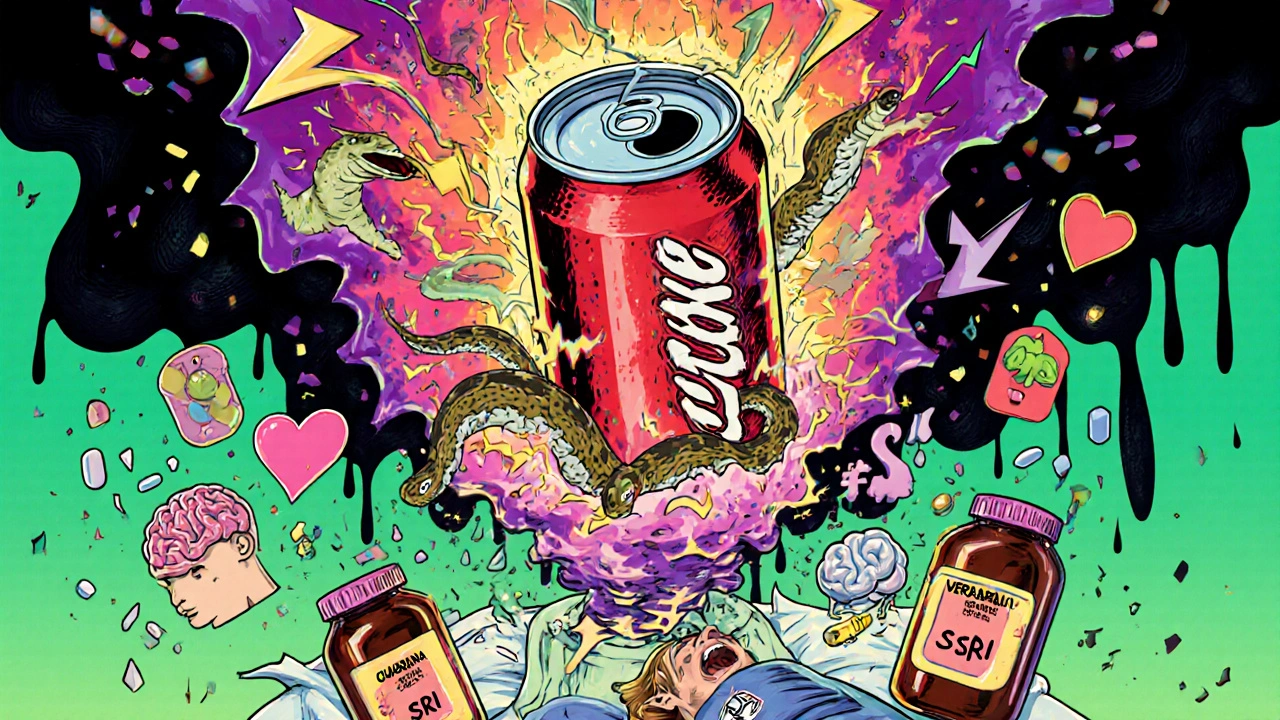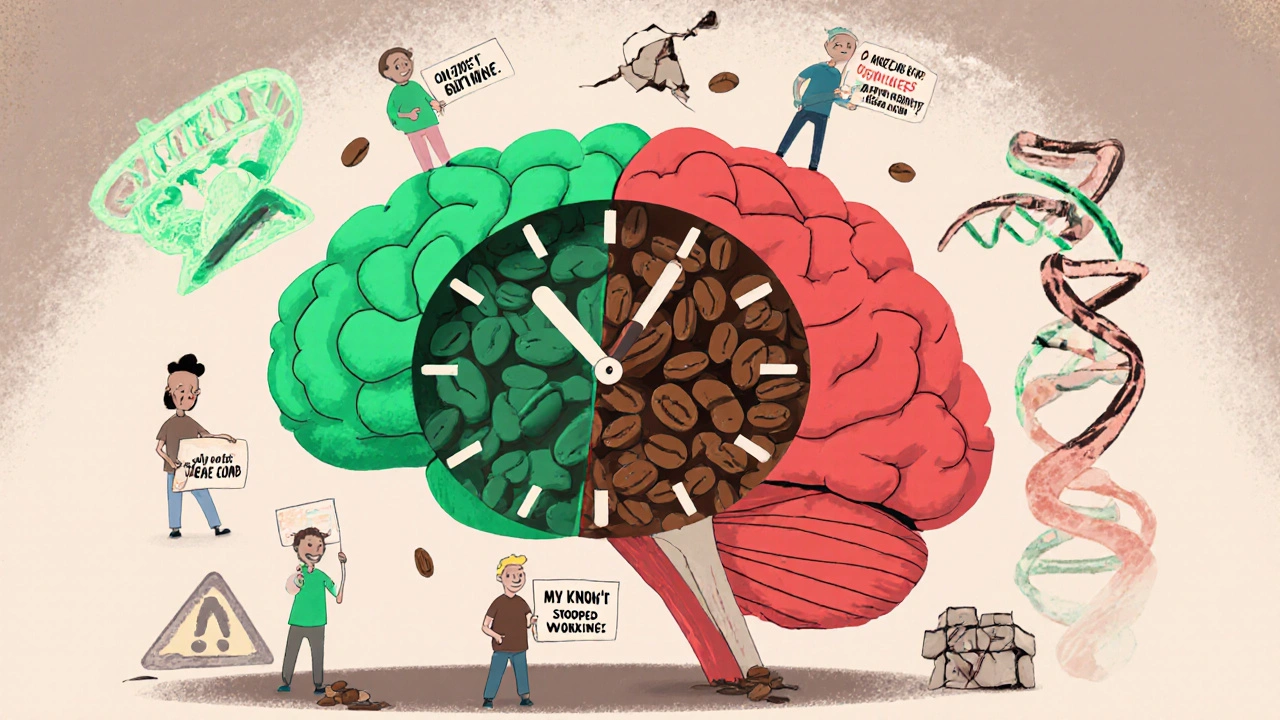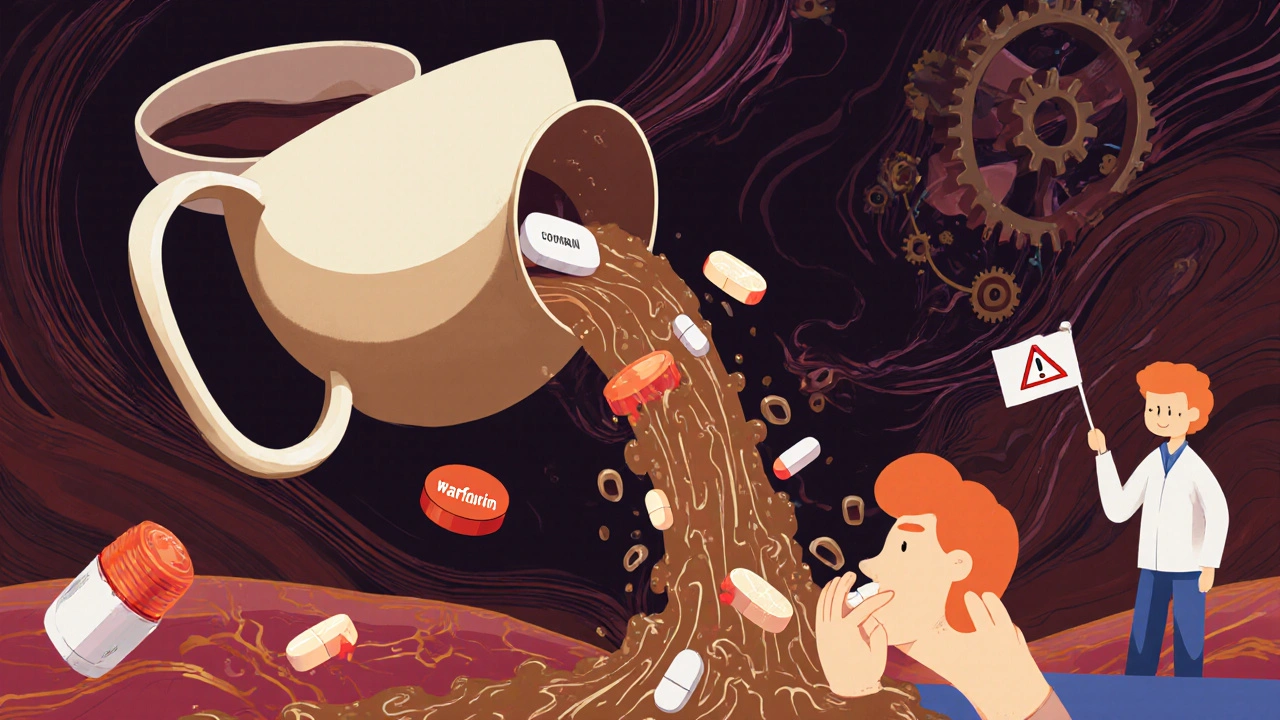Most people don’t think twice about their morning coffee - it’s routine, comforting, and often necessary to get through the day. But what if that cup of coffee is quietly undermining your prescription meds? Caffeine isn’t just a stimulant. It’s a powerful chemical that can interfere with how your body processes medications, sometimes with serious consequences. This isn’t theoretical. People are ending up in the ER because of it.
How Caffeine Interferes With Your Medications
Caffeine doesn’t just wake you up - it changes how your liver and gut handle drugs. It blocks an enzyme called CYP1A2, which is responsible for breaking down about 10% of all prescription medications. When caffeine sits in your system, it slows down this cleanup process. That means drugs build up in your blood, sometimes to dangerous levels. Other times, caffeine blocks absorption in your gut, so your meds never even get where they need to go.
It’s not just coffee. Energy drinks, tea, chocolate, and even some pain relievers contain caffeine. A single energy drink can pack 150-300 mg of caffeine - more than a strong cup of coffee. And if you’re taking multiple medications, the risk multiplies. The more drugs you’re on, the higher your chance of a bad interaction.
High-Risk Medications: What to Watch Out For
Some medications are especially vulnerable to caffeine. Here are the top ones you need to know about:
- Warfarin (Coumadin): Caffeine inhibits the enzyme that breaks down warfarin. That causes your INR - a measure of blood clotting - to spike by 15-25% within 24 hours. An INR above 4.0 puts you at serious risk of bleeding. One University of Michigan study found 41% of warfarin patients with high caffeine intake had unexplained INR spikes above 4.0. Some needed emergency care.
- Levothyroxine (Synthroid): Coffee reduces absorption of this thyroid medication by up to 55%. One patient reported their TSH jumped from 1.8 to 8.7 after taking levothyroxine with coffee for just three weeks. That’s a sign your thyroid isn’t getting the dose it needs. The American Thyroid Association recommends waiting at least 60 minutes after taking your pill before drinking coffee.
- Theophylline (for asthma): This drug and caffeine are metabolized by the same enzyme. When you combine them, theophylline levels can rise 15-20%. That’s enough to cause nausea, rapid heartbeat, or even seizures. Patients on theophylline are advised to limit caffeine to under 100 mg per day - about one small coffee.
- SSRIs like fluoxetine and sertraline: Caffeine can reduce absorption of these antidepressants by up to 33%. That means you might feel like your medication isn’t working, when in reality, your body just isn’t absorbing it properly. Users on Reddit report increased anxiety and mood swings after switching to coffee-heavy routines.
- Verapamil and other calcium-channel blockers: Coffee can reduce the blood pressure-lowering effect of verapamil by 25-30%. Harvard Health found this happens because caffeine competes with the drug for absorption in the intestines. Wait at least two hours after taking your pill before drinking coffee.
- Dipyridamole and adenosine: These are used in cardiac stress tests. If you’ve had caffeine in the past 24 hours, the test can be useless - efficacy drops by 70-90%. Hospitals now require patients to avoid caffeine for a full day before testing.
- Ephedrine and pseudoephedrine (in cold meds): Combining these stimulants with caffeine can spike heart rate by 20-30 beats per minute. In clinical trials, this combo increased systolic blood pressure by over 30 mmHg in 68% of cases. That’s a direct path to hypertensive crisis.

Why Energy Drinks Are Worse Than Coffee
It’s not just the caffeine. Energy drinks mix caffeine with taurine, ginseng, guarana, and sugar - all of which can independently affect how your body handles drugs. A 2021 analysis found that energy drinks cause more severe interactions than coffee, even at the same caffeine dose. Why? Because the other ingredients may also block liver enzymes or speed up heart rate, compounding the effect.
And because energy drinks are often consumed quickly and in large amounts, you’re more likely to hit a dangerous threshold. The FDA reported a 37% rise in caffeine-medication adverse events between 2020 and 2024 - and 68% of those serious cases involved energy drinks.
What Real Patients Are Reporting
Real stories show this isn’t just theory. On Reddit, a user named “ThyroidWarrior2023” described how their TSH skyrocketed after taking levothyroxine with coffee. Their endocrinologist confirmed it was textbook interference. Another user, “SeizureFree89,” cut coffee from four cups a day to one - and went from having 3-4 seizures monthly to none in six months. Their neurologist linked it to reduced effectiveness of Tegretol (carbamazepine).
On Drugs.com, over 1,200 users reported caffeine-antidepressant interactions. Nearly two-thirds said they felt more anxious. Almost a third said their medication stopped working. These aren’t anecdotes - they’re data points from real people who didn’t know their coffee was the problem.

How to Stay Safe: Simple Rules
You don’t have to give up caffeine. But you do need to be smart about it.
- Separate your meds and coffee. Wait at least 60 minutes after taking levothyroxine before drinking coffee. For calcium-channel blockers, wait two hours.
- Keep caffeine intake consistent. If you drink two cups of coffee every day, stick to that. Sudden increases - like switching from tea to espresso - can destabilize your INR or drug levels.
- Read labels. Check your medication’s side effects and drug interaction section. If caffeine is listed, pay attention.
- Ask your pharmacist. Pharmacists are trained to catch these interactions. They can flag risks you didn’t even know existed. Since 2023, the American Pharmacists Association requires pharmacists to screen for 17 high-risk caffeine-medication combinations during medication reviews.
- Limit energy drinks. If you’re on any prescription meds, avoid them entirely. The added ingredients make them unpredictable.
- Track your symptoms. If you start feeling jittery, anxious, dizzy, or notice your meds aren’t working like they used to - consider caffeine as a possible cause.
The Bigger Picture: Why This Is Getting Worse
More people are taking more medications. More people are drinking more caffeine. And fewer people know about the risks. A 2024 JAMA study found 62% of patients had no idea caffeine could interfere with their drugs - even though 89% consumed it daily.
Pharmaceutical companies are starting to respond. In 2025, 23% of prescription labels now include caffeine interaction warnings - up from 12% in 2019. Hospitals are testing new systems: Epic Systems rolled out a caffeine-interaction alert in 47 hospitals in April 2025. Early results show a 29% drop in related adverse events.
Future medicine will be personalized. The NIH is funding a $4.7 million study to map how genetic differences in the CYP1A2 enzyme affect caffeine interactions. By 2028, doctors may use genetic tests to tell you exactly how much caffeine is safe for you.
Until then, treat caffeine like any other drug. It’s powerful. It interacts. And if you’re on medication, you need to manage it carefully.
Can I still drink coffee if I take medication?
Yes - but timing matters. For most medications, waiting 1-2 hours after taking your pill before drinking coffee reduces risk. For levothyroxine, wait at least 60 minutes. For warfarin, keep your caffeine intake consistent and avoid sudden increases. If you’re unsure, ask your pharmacist or doctor.
Does decaf coffee have caffeine?
Yes - decaf coffee still contains 2-15 mg of caffeine per 8-ounce cup. That’s low, but if you’re on a medication like theophylline or warfarin and are extremely sensitive, even that small amount can add up. If you’re trying to eliminate caffeine entirely, switch to herbal tea or water.
What if I forget and drink coffee with my pill?
One accidental mix-up is unlikely to cause serious harm. But if it happens regularly, it can lead to medication failure or dangerous side effects. If you’re on warfarin, thyroid meds, or theophylline, get your levels checked sooner than scheduled. Tell your doctor what happened - they’ll know what to do.
Can caffeine make my antidepressant stop working?
It can. Studies show caffeine reduces absorption of SSRIs like fluoxetine and sertraline by up to 33%. If you’ve been feeling less effective, more anxious, or more depressed after increasing your coffee intake, caffeine could be the culprit. Try cutting back for two weeks and see if your mood improves.
Are there any medications that are safe with caffeine?
Yes. Many common medications - like metformin for diabetes, statins for cholesterol, and most antibiotics - have no known significant interaction with caffeine. But that doesn’t mean you’re safe. Always check with your pharmacist. Some interactions aren’t well-documented yet, and new ones are being discovered all the time.


Sharley Agarwal
Wow. Just... wow. I took my Synthroid with coffee for two years. No wonder I felt like a zombie.
prasad gaude
In India, we drink chai with everything - breakfast, medicine, grief, love. But now I wonder - is my heart racing because of stress... or because my amlodipine never stood a chance? Maybe tradition needs a new recipe.
Jennifer Griffith
ok but like… i drink 3 espressos a day and take metformin and statins and i’m fine? so is this just fearmongering? also why does everyone act like caffeine is poison???
Patricia McElhinney
It’s alarming that so many individuals remain oblivious to pharmacokinetic interactions, particularly given the well-documented inhibition of CYP1A2 by methylxanthines. The FDA’s 37% increase in adverse events between 2020 and 2024 is not anecdotal - it’s a systemic failure of patient education. Pharmacies must implement mandatory counseling protocols, not leave it to chance. This is not a lifestyle choice; it’s a clinical hazard.
Rachel Villegas
My dad was on warfarin and drank 2 cups of coffee every morning without changing anything. His INR stayed perfect. But when he switched to espresso for a week, his numbers spiked. Consistency matters more than elimination. Talk to your pharmacist - they’re the real heroes here.
Amy Hutchinson
so i took my sertraline with coffee this morning and now i feel like i’m gonna explode. is this normal?? should i just stop coffee?? i dont wanna be depressed again
Archana Jha
They don’t want you to know the truth. Caffeine isn’t the problem - it’s the corporate pharmaceutical agenda. The FDA, big pharma, and the coffee industry are all in cahoots. They want you to believe you need to wait 60 minutes - but what if the real danger is the synthetic fillers in your pills? The CYP1A2 enzyme? It’s been manipulated since the 80s. They’re hiding the truth about how caffeine actually cleanses your liver. You think you’re saving yourself by avoiding energy drinks? Think again. The real enemy is the sodium benzoate in your ‘decaf’ coffee. I’ve seen it. I’ve tested it. Your thyroid is being poisoned by the system.